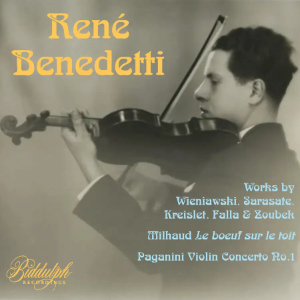
René Benedetti (violin)
Maurice Faure (piano)
Jean Wiener (piano: Milhaud), Joseph Benvenuti (piano: Zoubek)
Orchestre Symphoniques des Concerts Lamoureux/Eugène Bigot
rec. 1927-32, 1941 (Paganini), Paris
Biddulph 85046-2 [84]
René Benedetti is by no means a forgotten violinist but his name tends to crop up less in connection with his own magnificent playing than in terms of his many students, among whom one can number Christian Ferras and Jean-Jacques Kantorow as well as Neville Marriner, who often spoke of Benedetti with admiration, and John Georgiadis amongst many others. This release will naturally focus things squarely on Benedetti who was born in 1901, the same year as Heifetz, and died in 1975.
He was swept up by Les Six very early and by the age of twenty he had won a notable premiere, Milhaud’s adaptation of Le boeuf sur le toit, written for Benedetti and composer-pianist Jean Wiener. They gave the première in 1921 and recorded it seven years later as we can hear in this disc. Benedetti made his American debut in 1922, his first Berlin appearance following in 1946, but though he travelled widely he seems not to have made many return visits unlike, say, his older compatriot Jacques Thibaud who was an inveterate traveller spending much of his life on the international circuit endlessly revisiting cities.
The bulk of Benedetti’s discs were made for French Columbia between 1927 and 1936. It’s our bad luck that, apart from the Paganini Concerto here, he made no further concerto recordings and no sonata ones either. There are three trios with his B.B.N trio (Benedetti, André Navarra, Joseph Benvenuti) so let’s hope that these can be transferred before too long. Benedetti was a scintillating player with a succulent tone and a virtuoso command of the instrument. His Wieniawski is dashing and the trio of Sarasate pieces dispatched with a suave ease allied to a stylish wit, especially in Malagueña. Kreisler reveals his tonal vibrancy and Falla his intensity as well as a compellingly buoyant sense of rhythm – the Jota in the familiar Kochanski arrangement is an especially clear example of this last quality.
The Milhaud features Honegger’s spirited cadenza and is played with a dazzling control of its Brazilian rhythms and tricksy corners – really inventive, imaginative and idiomatic playing by two players perfectly attuned to its style. Benedetti also plays two pieces by Czech violinist Karel Zoubek. No one else, to my knowledge, played any Zoubek in the 78 or LP era, so these are rare pieces. Sérenade à Elen is a winsome little character piece but its companion, Deux minutes de Jazz, is a fizzer – just over two minutes of cocksure, pizzicato-laced Ragtime dispatched with suitably cocky élan.
Paganini’s Concerto No.1 was recorded in September 1941 with the Orchestre Symphoniques des Concerts Lamoureux conducted by Eugène Bigot for Pathé and bears quite a ration of wartime surface noise. It has been transferred before (review), a decade ago on Meloclassic but this transfer is much better. Meloclassic tried to deal with the thistly shellac by excessive noise suppression, but the result was dull. Yes, the orchestra’s strings sound rather strident here but it’s far better to get the full sonic picture than to roll off treble. I’ll reprise here by and large what I wrote in that previous review.
‘This is simply stunning. The cadenza, alone, was once included in Thomas Clear’s LP boxes of great violin performances (TC 2580) but to hear the whole thing is to experience one of the great Paganini concerto performances. By all accounts Benedetti had a big tone, though one wouldn’t necessarily think so from the recording, but his effortless digital legerdemain, his stylistic brilliance, and sheer flair, have to be savoured in full. Savoir faire, superb intonation, witty Gallic insouciance, magnificent bowing, legato refinement, subtle vibrato usage – where does one begin in measuring Benedetti’s glittering and magnificent playing? Benedetti does have a pronounced habit of slowing right down into disc turn-overs but that hasn’t affected side-joins in this transfer. Finally, as a footnote, this ensemble was clearly considered just the thing for Paganini because once the war was over the orchestra and conductor reconvened to accompany a new rising star in the same work, Ruggiero Ricci.’
Symposium 1330 devoted half the disc to Benedetti’s recordings and includes six of the same pieces as Biddulph. Once again, I’m inclined to prefer Biddulph’s work.
The copies used here are very fine and they have been sympathetically transferred. Tully Potter’s notes are full and helpful. This excellent release celebrates a fantastic violinist who should be far better known.
Jonathan Woolf
If you purchase this recording using a link below, it generates revenue for MWI and helps us maintain free access to the site


Contents
Henryk Wieniawski (1835-1880)
Souvenir de Moscou, Op.6 (1853)
Pablo de Sarasate (1844-1908)
Habanera, Op.21 No.2
Malagueña, Op.21 No.1 (1875)
Zapateado, Op.23 No.2
Fritz Kreisler (1875-1962)
Caprice viennois, Op.2
Tambourin chinois, Op.3
Manuel de Falla (1875-1947)
Suite Populaire espagnole: Asturiana, Polo, Cancion, Jota (1914-15) arr. Kochanski
La vida beve: Danse espagnole arr. Kreisler
Darius Milhaud (1892-1974)
Le boeuf sur le toit arr. Honegger (1919)
Karel Zoubek (1902-1959)
Sérenade à Elen
Deux minutes de Jazz
Nicolò Paganini (1782-1840)
Violin Concerto No.1 in D major, Op.6, MS21 (1815)

















